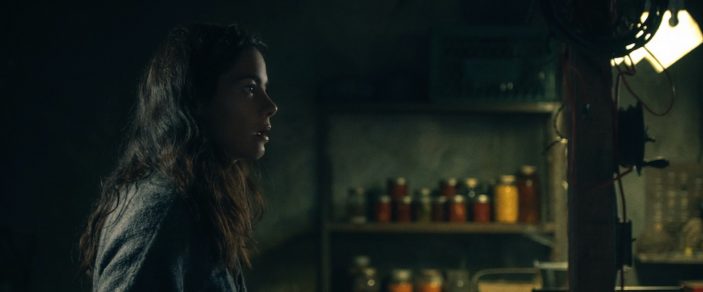
Vampirism has often been utilised in genre features as a metaphor for an addiction of sorts. In Brad Anderson‘s Blood, screenwriter Will Honley (Escape Room: Tournament of Champions) furthers not only the addiction thematic, but blends it with the notion of chronic illness, what that can do to the afflicted’s caretaker, and a mother’s instinct to protect her child and how far such a mentality would take her.
A recovering addict in the throws of trying to prove her stability and gain custody of her children, Jess (a dedicated Michelle Monaghan) is fighting a constant uphill battle against her ex-husband (a stable Skeet Ulrich), who secured the house, the babysitter, and a new baby during their marriage breakdown, and is using her history as an addict against her; despite these tactics, Ulrich’s character is never presented as a bad father figure fighting her out of maliciousness, merely looking at what’s in front of him and seeking the best environment for his children.
Said children, Tyler (Skylar Morgan Jones) and Owen (Finlay Wojtak-Hissong), are transporting between both of their respective parents’ homes, with Jess having shipped them out to the middle of nowhere to live in her family farmhouse, hoping the change of scenery will reflect positively all around. Unfortunately, given the genre Blood rests in, all is not calm in the surroundings, with a dried-up lake and the mysterious tree growing out of it proving uneasy to the children, Owen especially. Later, his beloved dog goes missing, leaving Owen inconsolable and Jess immediately concerned that his depression will reflect on her as a parent.
It isn’t long before the pooch returns, but his demeanour is savagely aggressive, and when Owen attempts to greet him he’s violently attacked, losing copious amounts of blood in the process. Given the dog’s change of nature and its werewolf-esque temperament, one could rightfully assume Anderson’s film might follow such a narrative route and place Owen’s canine as the film’s big bad. Rather refreshingly, it’s Owen and, eventually, Jess that dance with villainous inclinations, but Blood is never simply as black and white as that regarding who’s good and who’s bad, with Owen’s sudden hunger for blood letting the film indulge in the grey area in between.
Initially repulsed by her son’s need to drink blood, Jess has to honour her motherly instinct above all else, eventually leaning into a variety of creative outlets to satisfy Owen’s cravings, which ultimately leads to a subplot that very much speaks to the film’s logline of how far one would go for the love of their child. Jess has to do some truly unspeakable things, but it’s out of nothing but love, and thanks to the passionately nuanced performance of Monaghan, we completely understand her reasoning – even if we don’t agree with it.
In trying to keep Owen’s hunger at bay – and a secret from those closest to him – Jess neglects her own well-being, becoming lethargic and distracted, which only concerns her ex on the outside looking in, only (rightfully) assuming she’s relapsed and using again. It’s a delicate balance of filmic personalities that Anderson toes, managing to lace any familiarity with a certain reality that assists in the film in feeling authentic.
On the surface, Blood has all the ingredients of an easy genre watch, a bloody, horror-adjacent tale detailing vampirism. But thanks to committed performances, well-executed emotion and a respect for its addiction thematics, Anderson’s investing thriller delights in its commentary on self-preservation and self-sacrifice, resulting in a far more intelligent effort than its horror packaging suggests.
![]()
![]()
![]()
![]()
![]()
THREE AND A HALF STARS (OUT OF FIVE)
Blood is currently screening in theatres in the United States, before arriving On Demand on January 31st, 2023. An Australian release date is yet to be determined.
